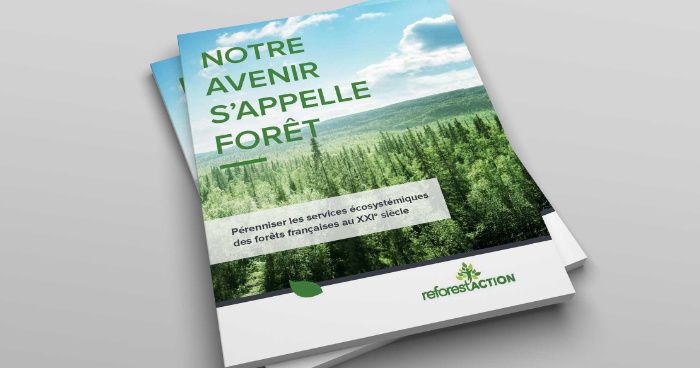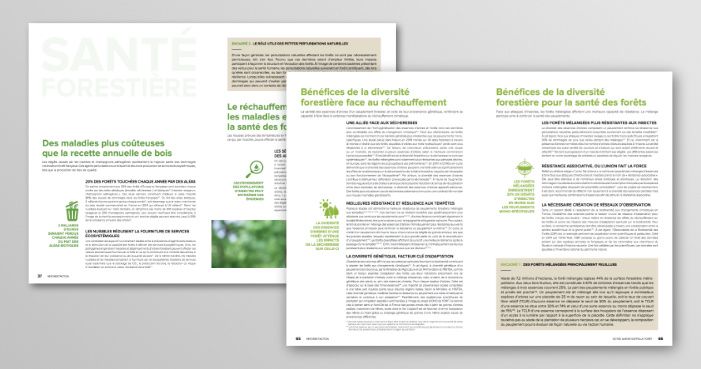Reforest’Action publishes today “Notre Avenir S’appelle Forêt” (Our Future is Named Forest), the first report that thoroughly analyses the ecological, economic and social issues of French forests during the 21st century and suggests answers to these challenges: the renewal of forests based on forest diversity as an ally.

Product of the review of 150 scientific sources and other specialized publications, the document was proofread by an INRA, FNE (France Nature Environnement), Fransylva and FSC expert committee. This unprecedented report deals with the main challenges that French forests and its wood industry will face during this century, such as the current and future manifestations of climate change (drought, wildfires, storms, etc.), the growing biotic hazards (insect attacks and illness) and the growing societal expectations. This document also reveals the crucial benefits of forest diversity in terms of sustainable production of ecosystemic services, such as CO2 storage for climate or wood production. It also underlines the benefits of mixed forests in terms of enhanced resistance to environmental disruptions.
This innovative report offers an answer to the outlined issues through the implementation of a Common Base of Multifunctionality, as a set of good practices to perform on reforestation projects in France to face climate change. This Base aims at sustaining, at the scale of each forest parcel, the supply of ecosystemic services, and strengthening the resistance and the adaptation of a population of trees to environmental disruptions. Its deployment to a large scale will contribute to secure the long-term use of multinational French forests for future generations.
Environmental disruptions threaten forests’ health, values, and use
First terrestrial carbon sink, main home for metropolitan biodiversity and rich sector of 440 000 jobs, French forest will be impacted during the current century by diverse environmental disruptions among which: droughts increase and the aggravation of their average intensity, the extension of wildfire risks to the whole of France, the potential increase of storms and their damages in Western Europe.
And while 20% of French forest face each year abiotic (wildfires, droughts,) and biotics (destructive insects, pathogenic fungus, …) hazards, these alone cause an annual loss of 2 billion euros, more than the annual value of commercialized wood in 2014. Combine with temperature increase, the exponential increase exotic insects in Europe threatens our forests health and their capacity to provide sustainable ecosystemic services such as CO2 storage, wood production or the more than 1 billion of recreational visits in forests each year.

Forest diversity, an indispensable ally for the production of ecosystemic services and the forest resistance
To cope with the threats of environmental disruptions on French forests during the 21st century, the report shows that forest diversity, meaning the diversity of tree species in a forest, is an indispensable ally. Mixed forests have numerous assets compared to mono-species forests:
- They are generally (not systematically) more resistant to droughts and storms
- They are more resistant to insect attacks;
- They produce better ecosystemic services, such as CO2 storage crucial to fight climate change, or wood production, essential for the sector and the energy transition;
- They reduce the risk of economic degradations due to biotic and antibiotic hazards;
- They meet the growing social needs;
- They contribute to reducing the risk of developing illness and public health spending.
Putting into practice a Common Base of Multifunctionality for the future of forests
“Thanks to this unprecedented holistic analysis of forest issues of the 21st century and convinced of the proved benefits of forest diversity, Reforest’Action innovates by proposing in this report the use of a Common Base of Multifunctionality”, explains Stéphane Hallaire, president and founder of Reforest’Action. He adds that “because forest diversity is an ally, this base is a set of principles applicable during the plantation or the regeneration of a forest aiming at ensuring the capacity for sustainable supply of exosystemic services, of resistance, adaptation, and resilience to current and future environmental disruptions”. As a concrete list of good practices of (re)forestation in times of climate change, the Common Base of Multifunctionality can be implemented by any actor of (re)forestation in France at a forest parcel level. Its execution at a national level will contribute to strengthening in the long-term the health and the socioeconomic use of a multifunctional metropolitan forest.